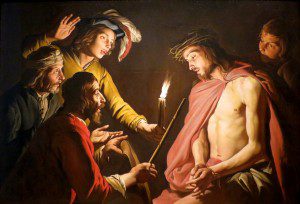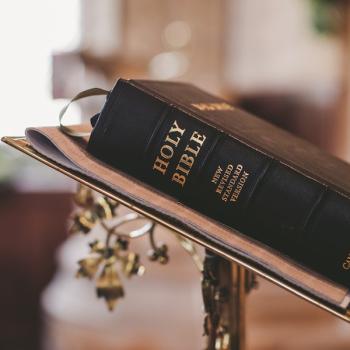
Just yesterday a post appeared on another Patheos blog called “A plea for a measure of incoherence” (call me old fashioned, but I go in for capitalizing my titles. I do like e.e. cummings though). The piece is a wonderful exploration of not only the inevitability of ambiguity but also of its desirability (a topic on which I have commented before). Here’s an especially nice tidbit:
[It’s] true that there were those in these controversies that fought boldly, even defying authority. We tend to remember the few great ones (Sts. Cyril and Athanasius, for example) who were vindicated and not the many who went astray. I want to suggest that it is extremely unlikely that anyone reading this is a Cyril or Athanasius, and pretending you are could get you into trouble…As Catholics we need to foster within ourselves a kind of negative capability– the ability to stay in uncertainty and seeming contradiction without trying to arrive at a definitive but premature resolution. In the meantime, we know the demands and discipline of the Christian life and we know of our need to stay in union with our bishop, and our bishop to the Holy Father. Communion first. Clarity later.
This made for an especially interesting read in light of recent comments by Bishop Athanasius Schneider, which, as interpreted by One Peter Five, call for a Veritatis Laetitia to elucidate the (clearly error-ridden) Amoris Laetitia:
When it comes to the life or death of the body,” Schneider says, “no doctor would leave things in ambiguity. The doctor cannot tell the patient, ‘You should decide how to apply the medicine according to your conscience and following the laws of medicine.’ Such behavior on the part of a doctor would undoubtedly be considered irresponsible. Yet the immortal life of the soul is more important…”
Cursed ambiguity! Unholy exceptions! The Fathers must be rolling over in their graves as we grapple with mercy—that unfortunate concept, which most often hides the rot of heresy! Gott hilf uns (the author of the One Peter Five piece linked to above is German. I couldn’t help myself)!
The piece goes on, quoting the prelate, to acknowledge that Pope St. John Paul II did allow certain exceptions to the rule:
Bishop Schneider quotes Pope John Paul II’s Familiaris Consortio (FC) on this matter, which states that such couples “are unable to be admitted thereto, since their state and their condition of life objectively contradict that union of love between Christ and the Church signified and effected by the Eucharist. There is another special pastoral reason: if these people were admitted to the Eucharist, the faithful would be led into error and confusion regarding the Church’s teaching on the indissolubility of marriage. Reconciliation in the sacrament of Penance – which opens the way for the sacrament of the Eucharist – can only be granted to those who have repented for having violated the sign of the covenant and of fidelity to Christ, they are sincerely ready to undertake a way of life no longer in contradiction with the indissolubility of marriage. This means, in practice, that when a man and a woman, for serious motives – such as, for example, the education of children – can not [sic] satisfy the obligation to separate, they ‘take on the duty to live in complete continence, by abstinence from the acts proper to spouses.’”
Of course, we have no idea (in most cases) who is remaining celibate at home and who is not. When I choose to kneel in the pews during Communion because I have not gone to Confession, this is my choice, in line with what is right. But, were I to go up, the priest would have no idea I was in a state of mortal sin. The same applies to “remarried” couples.
This is not an argument for the Communing of the “remarried” (though, Lord knows, someone will take it to be that). It is a recognition of the ambiguity at the heart of existence itself, an indication that no matter how many rules we formulate, no matter how bureaucratically rigid we make the Church (and it is rather funny that many who desire such increased “clarity” are opposed to bureaucracy in American politics—but that’s an irony for another time) there will always be exceptions. In fact, 2000 years of Church history are likely to have created more complications and difficulties than to have resulted in absolute lucidity.
And yet, we appeal to Truth. One Peter Five, by calling for a Veritatis Laetitia, does just this. Truth is intended in opposition to all ambiguity. And yet what does Christ say? “I am the way and the truth and the life.” (John 14:6). Jesus illumines the darkness of existence, surely. But if we take this metaphor to merely mean that all things become pure light, purely and easily comprehensible, we have erred. God’s absolute truth is beyond our eyes, opaquely accessible to this fallen world. Witness Pseudo-Dionysius the Areopagite:
Trinty, which exceedeth all Being, Deity, and Goodness! Thou that instructeth Christians in Thy heavenly wisdom! Guide us to that topmost height of mystic lore which exceedeth light and more than exceedeth knowledge, where the simple, absolute, and unchangeable mysteries of heavenly Truth lie hidden in the dazzling obscurity of the secret Silence, outshining all brilliance with the intensity of their darkness, and surcharging our blinded intellects with the utterly impalpable and invisible fairness of glories which exceed all beauty!
God himself is conceived of as light so blinding, it appears as darkness, so majestic and awe-inspiring as to be in (and elicit) silence. In other words, the opposition of Truth and ambiguity is, in a sense, misguided. Absolute clarity is impossible for all, save perhaps those most blessed mystics (and, while I do not mean to presume, I do not think that either the writers at One Peter Five or Bishop Schneider are the equivalents of the Desert Fathers and Mothers, Pseudo-Dionysius, or St. Bridget of Sweden). To seek more clarity is understandable, though such must be done in light of the opacity of our fallen existence. And perhaps, just perhaps, if we sit in the silence of God’s day, if we open our hearts to Him, who is the way, the truth, and the life, we might experience the Tenebrae Laetitia, the Joy of Concealment (or, of Darkness), that is the joy of listening to others and to God. In doing so, we might be moved to the reflection the Pope has asked of us as a reaction to this document; in doing so, we might hear the words of Kierkegaard: “Seek first God’s Kingdom, that is, become like the lilies and the birds, become perfectly silent — then shall the rest be added unto you.”













